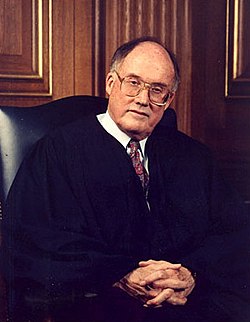| Antoine v. Washington | |
|---|---|
 | |
| Argued December 16, 1974 Decided February 19, 1975 | |
| Full case name | Alexander J. Antoine, et ux. v. State of Washington |
| Citations | 420 U.S. 194 ( more ) 95 S. Ct. 944; 43 L. Ed. 2d 129 |
| Argument | Oral argument |
| Case history | |
| Prior | State v. Antoine, 511 P.2d 1351 (Wash. 1973) |
| Holding | |
| 1. Treaties and laws must not be construed to the prejudice of Native Americans (Indians). 2. The Supremacy Clause precludes the application of state game laws to the tribe. Contents
3. Congress showed no intent to subject the tribe to state jurisdiction for hunting. 4. While the state can regulate non-Indians in the ceded area, Indians must be exempted from such regulations. | |
| Court membership | |
| |
| Case opinions | |
| Majority | Brennan, joined by Burger, White, Marshall, Blackmun, Powell |
| Concurrence | Douglas |
| Dissent | Rehnquist, joined by Stewart |
| Laws applied | |
| U.S. Const. art. VI, § 2 | |
Antoine v. Washington, 420 U.S. 194 (1975), was a United States Supreme Court case in which the Court held that treaties and laws must be construed in favor of Native Americans (Indians); that the Supremacy Clause precludes the application of state game laws to the tribe; that Congress showed no intent to subject the tribe to state jurisdiction for hunting; and while the state can regulate non-Indians in the ceded area, Indians must be exempted from such regulations.


